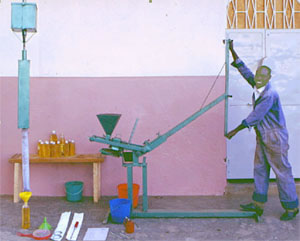 The most famous of these organizations is probably Practical Action - Intermediate Technology Development Group. It was founded in 1966 by E. F. Schumacher, the author of Small is Beautiful, which is considered the founding text of the AI movement.
The most famous of these organizations is probably Practical Action - Intermediate Technology Development Group. It was founded in 1966 by E. F. Schumacher, the author of Small is Beautiful, which is considered the founding text of the AI movement.Practical Action is a charity registered in the United Kingdom which works directly in four regions of the developing world – Latin America, East Africa, Southern Africa and South Asia, with particular concentration on Peru, Kenya, Sudan, Zimbabwe, Sri Lanka, Bangladesh and Nepal.SRISTI (Society for research and initiatives for sustainable technologies and institutions)
In these countries, Practical Action works with poor communities to develop appropriate technologies in food production, agroprocessing, energy, transport, water and sanitation, shelter and disaster mitigation.
Lessons from Practical Action's grassroots experience are spread through consultancy services, publishing activities, education, advocacy and campaigns, and through an international technical enquiries service.
SRISTI, which means creation, was born in 1993 essentially to support the activities of the Honey Bee Network to respect, recognize and reward the creativity at grassroots. Based in Ahmedabad, Gujarat, SRISTI (Society for Research and Initiatives for Sustainable Technologies) is a registered charitable organization that is devoted to empowering the knowledge rich-economically poor people by adding value in their contemporary creativity as well as traditional knowledge. It has helped establish GIAN, NIF, MVIF and AASTIIK.The Enterprise Group/VITA is a U.S.
 non-governmental organization, which is some four decades old. Founded as Volunteers in Technical Assistance (VITA), years ago it ditched its files of technological information and today describes itself as working
non-governmental organization, which is some four decades old. Founded as Volunteers in Technical Assistance (VITA), years ago it ditched its files of technological information and today describes itself as workingto combat poverty by helping small producers and other entrepreneurs build sustainable businesses that create jobs and increase productivity, market opportunities and incomes. EWV achieves this by expanding access to appropriate technologies, technical assistance, knowledge and finance.The Program of Appropriate Technology in Health (PATH) "is an international, nonprofit organization that creates sustainable, culturally relevant solutions, enabling communities worldwide to break longstanding cycles of poor health." In collaboration with diverse public- and private-sector partners, we it seeks to "provide appropriate health technologies and vital strategies that change the way people think and act."
Engineers Without Borders - USA (EWB-USA) "is a non-profit humanitarian organization established to partner with developing communities worldwide in order to improve their quality of life. This partnership involves the implementation of sustainable engineering projects, while involving and training internationally responsible engineers and engineering students."
Telecoms sans Frontiers is an international NGO that speciaiizes in telecommunications technology, and is especially involved in providing communications infrastructure in emergency situations.
ACCION International is a four decade old non-governmental organization focusin on the social innovation of microfinance. It also has a program of technical assistance which includes advice on hardware and software for the microfinance industry, While the microfinance organizations that use this technology are themselves often quite large and sophisticated, the ACCION International technology enables them to provide microfinance services to the poor in developing nations in a more affordable manner, and is in fact tailored to the interface between the poor and the financial institutions that serve the poor.
The U.S. National Center for Appropriate Technology focuses on agricultural, rural and energy sustainable technologies, emphasizing the needs of the U.S. agricultural communities that it targets through its national and regional centers.
The Appropriate Technology Institute of Equip. I don't personally know this organization, which works with Christian missionaries to promote appropriate technology innovations in developing countries in conjunction with their missionary efforts. The website suggests that it has a number of good programs in water, health and other technologies.
There are some good sites for information on appropriate technologies. These include:
 CTA:
CTA:
The New Zealand Digital Library which has a large number of digital documents online, including the Humanity Development Library which includes a large collection of materials on appropriate technologies. I especially recommend the monographs from the National Academy of Scienes Board on Science and Technology for International Development (BOSTID). These are somewhat dated, but contain a large amount of information on underexploited technologies of potential economic value to developing nations.an ACP-EU institution working in the field of information for development. We operate under the ACP-EU Cotonou Agreement and our headquarters are in The Netherlands.
When it was set up, in 1984, CTA was given the challenging task of improving the flow of information among stakeholders in agricultural and rural development in African, Caribbean and Pacific (ACP) countries.
The World Agricultural Information Center of FAO (WAICENT): provides access to information on agriculture, forestry, fisheries, sustainable rural development, economics, food and nutrition. The FAO WAICENT Portal provides tools for navigating and accessing thaat information. The FAO Web site is a comprehensive source of agricultural information, having approximately 500 000 web pages, over 100 databases, and thousands of documents.
The Human Info NGO. This Belgian NGO has developed a number of information bases on development topics, including the Humanity Development Library mentioned above. They are available on CD-ROM for a modest fee (to cover shipping and handling).
No comments:
Post a Comment